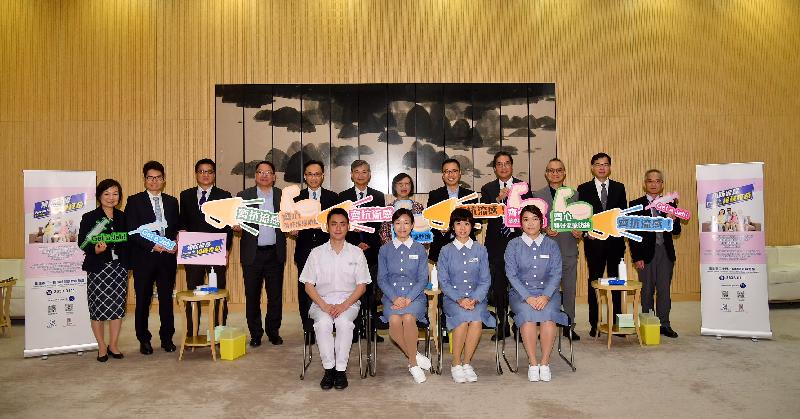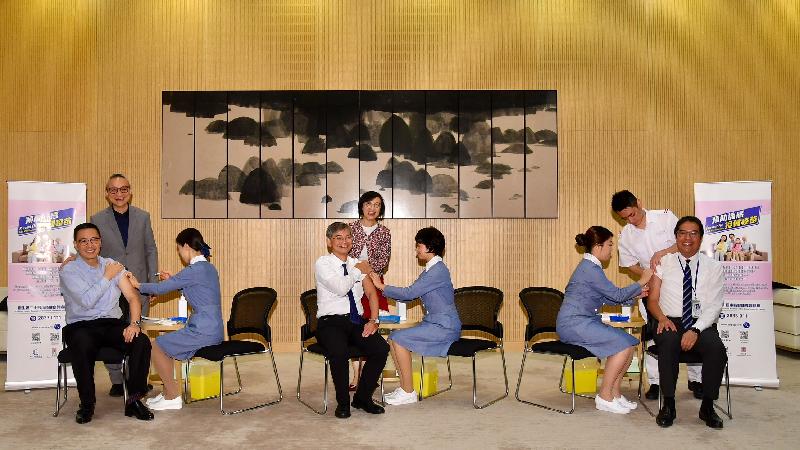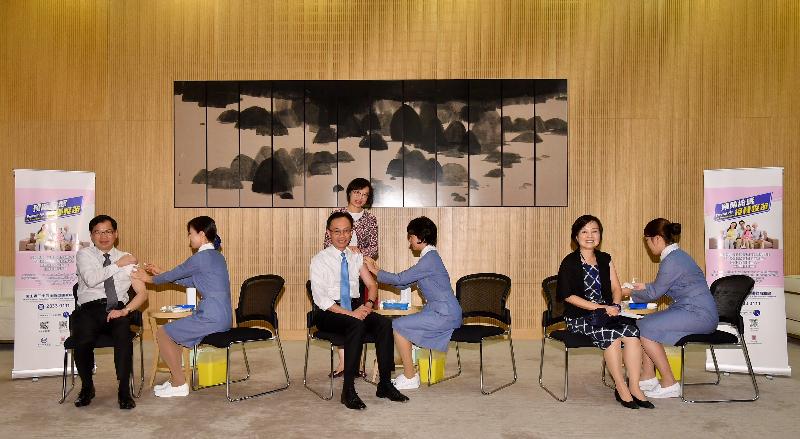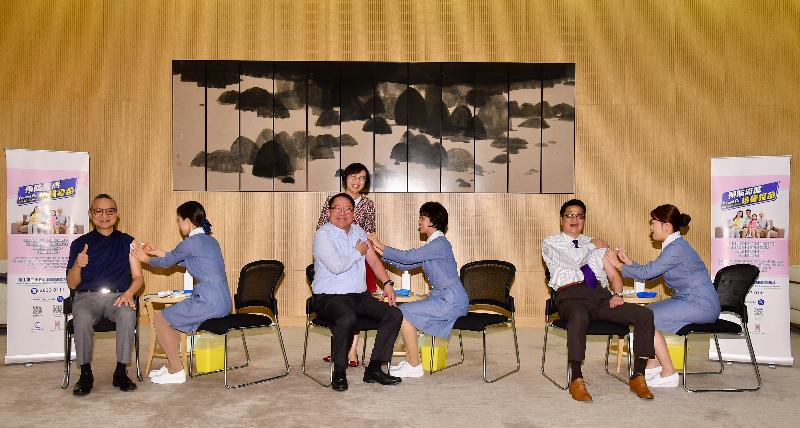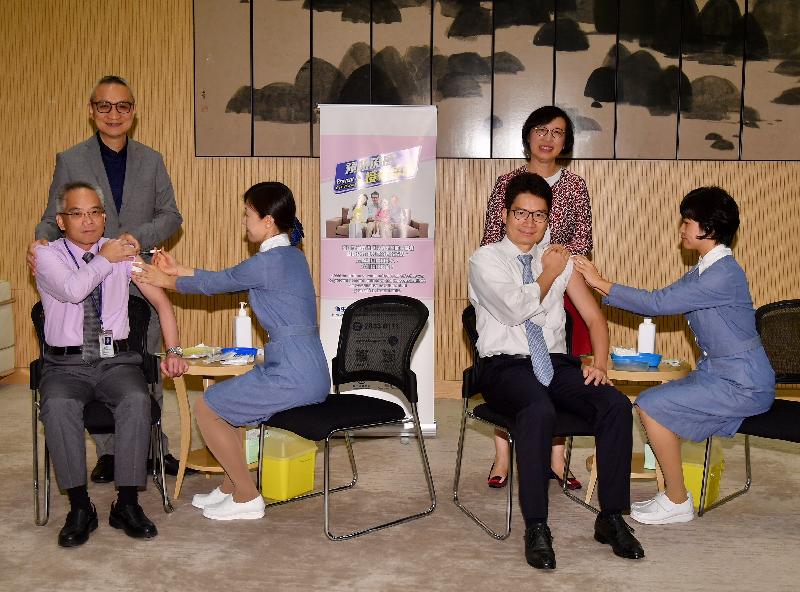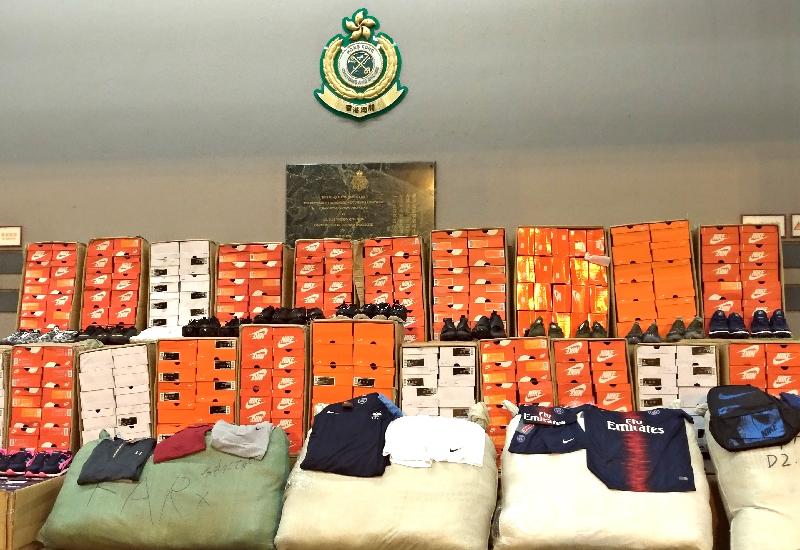LCQ11: Combating “bogus marriage”
Following is a question by the Hon Jeremy Tam and a written reply by the Acting Secretary for Security, Mr Sonny Au, in the Legislative Council today (November 21):
Question:
It has been reported that some cross-boundary "bogus marriage" syndicates provide one-stop services. Such services include: arranging "bogus marriage" for their clients to facilitate their application for Permits for Proceeding to Hong Kong and Macao (commonly known as One-way Permits (OWPs)), and taking care of the divorce procedure on behalf of their clients after they come to settle in Hong Kong. On combating "bogus marriage", will the Government inform this Council:
(1) of the number of divorces and the divorce rate in each of the past five years in respect of those couples who were both Hong Kong permanent residents (HKPRs), with a breakdown by duration of marriage (namely, two years or below, three to four years, five to six years and seven to nine years);
(2) whether it will start compiling statistics on the number of divorces and divorce rates in respect of those couples one party to which is a person who came to Hong Kong for settlement on OWPs, broken down by such persons' year of residence (namely, two years or below, three to four years, five to six years and seven to nine years) in Hong Kong, for comparison with the corresponding figures in (1); if so, of the details; if not, the reasons for that;
(3) whether OWP holders who have settled in Hong Kong for less than seven years will, for the reason of their divorce with HKPRs, have their Hong Kong identity cards and residence status invalidated by the Immigration Department (ImmD) and be subject to repatriation to their places of origin;
(4) among the 1 542 suspected "bogus marriage" cases investigated by ImmD in the past three years, of the number of those in which ImmD decided, after proactively analysing the relevant situation, to initiate investigations;
(5) of the statistics on convictions in each of the past five years involving offences related to "bogus marriage" (set out in the table below); and
| Year | Number of defendants convicted on own plea (A) |
Number of defendants convicted after trial (B) |
Number of defendants acquitted after trial (C) |
Conviction rate after trial (B)/[(B)+(C)] |
Conviction rate including guilty plea [(A)+(B)]/ [(A)+(B)+(C)] |
| Magistrates' Court | |||||
| 2013 | |||||
| 2014 | |||||
| 2015 | |||||
| 2016 | |||||
| 2017 | |||||
| District Court | |||||
| 2013 | |||||
| 2014 | |||||
| 2015 | |||||
| 2016 | |||||
| 2017 | |||||
| Court of First Instance | |||||
| 2013 | |||||
| 2014 | |||||
| 2015 | |||||
| 2016 | |||||
| 2017 | |||||
(6) of the number of spot checks by home visits conducted by ImmD in the past five years for investigating suspected "bogus marriage" cases; the respective numbers of offenders who were arrested, prosecuted and convicted as a result of the evidence obtained from (i) such operations and (ii) all operations other than such operations, and the percentages of those figures in the total number of suspected "bogus marriage" cases?
Reply:
President,
The Government has always been concerned about "bogus marriages". The Immigration Department (ImmD) set up a special task force in 2006 to step up enforcement actions to combat such offences to prevent persons seeking entry into Hong Kong by means of "bogus marriages" and intermediaries aiding others to seek entry into Hong Kong through such means. When suspected "bogus marriage" cases are identified, ImmD will conduct in-depth investigations on parties alleged to arrange and participate in "bogus marriages", collect evidence and initiate prosecution.
Any persons who make use of "bogus marriage" to obtain the requisite documents for the purpose of entering Hong Kong, or any persons who facilitate others to achieve such purpose through arranging "bogus marriages" for them, shall be guilty of an offence. In the course of contracting "bogus marriages" and applying for entries into Hong Kong through such marriages, the persons involved may have committed offences such as conspiracy to defraud, making false representation to ImmD officers, making a false oath, giving false declaration, bigamy, etc., and are liable on conviction to imprisonment for up to 14 years.
The reply to the questions raised by the Hon Tam is as follows:
(1) and (2) To get a divorce in Hong Kong, one should file a petition or an application for divorce to the court, and it does not need to be processed by marriage registries under ImmD. In consultation with the Census and Statistics Department (C&SD) and the Judiciary, it is noted that they do not maintain the statistics mentioned in the question. ImmD also does not have relevant figures. In fact, ImmD has conducted investigations into suspected "bogus marriage" cases via different channels and has been closely monitoring the latest practice and trends of arranging "bogus marriage" by illegal intermediaries and "bogus marriage" syndicates. From experience, collecting the divorce-related statistics requested in the question serves no direct purpose in assisting the enforcement authorities to detect suspected persons participating in "bogus marriages" as well as verifying the husband-and-wife relationships of the persons concerned in the course of investigation. At present, therefore, we have no plan to compile such statistical figures. According to the records stated in the feature article named "Marriage and Divorce Trends in Hong Kong, 1991 to 2016" published by C&SD in January 2018, the numbers of divorce decrees granted between 2012 and 2016 are as follows:
| Year | Number of divorce decrees granted |
| 2012 | 21 125 |
| 2013 | 22 271 |
| 2014 | 20 019 |
| 2015 | 20 075 |
| 2016 | 17 196 |
(3) and (4) ImmD has an established mechanism for handling cases of obtaining One-way Permits (OWPs) by fraudulent means. ImmD will also initiate investigation into doubtful marriages, receive intelligence and collect evidence from various sources and through different channels in order to investigate thoroughly the parties to suspected "bogus marriage" cases and the intermediaries involved. The relevant persons will be prosecuted when there is sufficient evidence. Once a case is substantiated, ImmD can declare the invalidation of a person's Hong Kong Identity Card, regardless of whether that person is a holder of Hong Kong Permanent Identity Card or has settled in Hong Kong for less than seven years and has divorced his/her Hong Kong permanent resident spouse. In addition, regardless of his/her years of residence in Hong Kong, ImmD has the authority to remove him/her from Hong Kong. ImmD does not maintain the relevant statistical figures mentioned in the question.
In processing OWP applications under the category of "reunion with spouses" and in case the husband-and-wife relationship is in doubt, the Mainland authorities will pass the particulars of the applicants and their spouses in Hong Kong to ImmD for verification of the personal particulars of the Hong Kong residents, their certificates of registration of marriage in Hong Kong or other relevant records. When suspected cases of "bogus marriage" or bigamy are identified, ImmD will initiate follow-up actions and notify the Mainland authorities of the verification results for follow-up.
ImmD has always been collecting intelligence of suspected "bogus marriage" through different channels and will initiate investigation and detect "bogus marriage" cases. In the 1 542 suspected "bogus marriage" cases investigated in the past three years, ImmD initiated investigations after proactively conducting in-depth analysis of information and intelligence gathered via different channels, which include but are not limited to the following:
(i) when conducting immigration examinations on arriving passengers, ImmD critically scrutinises doubtful visitors coming to visit their spouses in Hong Kong on strength of "exit endorsement for visiting relatives" and will refuse their entries if their purposes of visit are in doubt;
(ii) pays particular attention to Mainland residents holding "exit endorsement for visiting relatives" during anti-illegal worker operations;
(iii) marriage registries step up examination on suspicious marriage registrations; and
(iv) initiates investigation into criminal syndicates which publish advertisements with wordings such as "making quick cash" and "intermediary for Mainland-Hong Kong marriages" to allure people to engage in "bogus marriage" on social networking and instant messaging mobile applications, as well as newspapers and web pages.
In addition, in processing OWP applications under the category of "reunion with spouses" and in case the husband-and-wife relationship is in doubt, the Mainland authorities will pass the particulars of the applicants and their spouses in Hong Kong to ImmD for investigation. ImmD also from time to time receives suspected "bogus marriage" cases referred from other government departments in Hong Kong or reported by the public.
When suspected "bogus marriage" cases are identified, regardless of their sources, ImmD will proactively collect evidence through various channels, conduct thorough investigations on parties to the suspected "bogus marriage" and relevant intermediaries, and prosecute offenders where there is sufficient evidence.
(5) From 2013 to 2017, ImmD investigated into a total of 2 744 suspected cases of "bogus marriage", 5 208 persons were arrested as a result, out of which 606 persons were successfully convicted. Relevant statistics with breakdown by year is at the table below. In criminal prosecutions, the court requires the highest standard of proof of "beyond reasonable doubt". As it is not easy to prove the false husband-and-wife relationship, many difficulties have to be overcome in the course of adducing the proof. Therefore, not all cases can be successfully prosecuted. ImmD has to rely on corroborating evidence, such as the movement records of the couple and the statements of other witnesses and parties to the cases to instigate prosecutions against such offences. ImmD does not maintain other statistics with breakdown mentioned in the question.
| Year | No. of cases | No. of persons arrested |
No. of persons successfully prosecuted |
| 2013 | 515 | 1 102 | 188 |
| 2014 | 687 | 1 096 | 122 |
| 2015 | 461 | 1 016 | 113 |
| 2016 | 507 | 979 | 98 |
| 2017 | 574 | 1 015 | 85 |
| Total | 2 744 | 5 208 | 606 |
Note: The year of initiating investigation and completing prosecution against all parties to the cases may be different. As such, the number of persons successfully prosecuted generally does not correspond to the number of cases in the same year.
(6) In general, in handling suspected "bogus marriage" cases, the enforcement officers of ImmD will collect evidence through different channels, including carrying out spot checks by home visits, collecting circumstantial evidence and proof, conducting separate interviews with persons involved, etc, to verify the husband-and-wife relationships of the persons in the cases. In view of the uniqueness of each "bogus marriage" case, appropriate ways of collecting evidence and the evidence needed vary. The investigation officers will apply different and possibly more than one investigation methods according to the background and circumstances of each case. ImmD does not maintain the relevant statistical figures mentioned in the question.
To more effectively combat "bogus marriage", ImmD will continue to take various investigation actions with flexibility and skills in view of the trend of "bogus marriages" and circumstances of individual cases. ImmD will also continue to be committed to combating offences related to "bogus marriage" by stepping up enforcement, publicity, intelligence analysis and cross-boundary co-operation with a view to bringing the offenders to justice.
